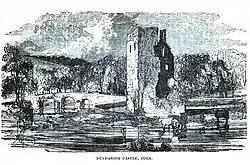Dundanion Castle
Dundanion Castle (Irish: Dún Daingean, meaning 'firm fortress')[1] is a Tudor tower house in the Blackrock area of Cork in Ireland.[2] Previously known as Galwey's Castle,[3] the ruin is located on the grounds of the much later "Dundanion House".[4][5]
| Dundanion Castle | |
|---|---|
| Native name Irish: Dún Daingean | |
 19th century engraving of Dundanion Castle | |
| Coordinates | 51.8974°N 8.4204°W |
| Area | Blackrock, Cork, Ireland |
| Built | c. 1564 |
| Built for | Galwey family |
| Architectural style(s) | Fortified limestone tower house |
 Dundanion Castle in Ireland | |
History
Though built on or close to the site of an earlier structure,[2] the existing limestone ruin dates to c.1564.[6] Built by the Galwey family, the castle is marked (as "Galwaies castle") on the Pacata Hibernia map of Cork which dates to the late 16th century.[1][7]
Owing to later land reclamation, the castle is now located some distance from the waterfront of the River Lee.[8] However an adjacent slipway demonstrates an earlier use,[8] and some sources ascribe the castle as William Penn's departure point on one of his voyages to the Americas ahead of the founding of Pennsylvania in the 1680s.[3][9]
The castle changed hands several times before falling into ruin. Several grand houses were built in the castle demesne before architect, Sir Thomas Deane built "Dundanion House" in the 1830s.[4][5] Contemporary Deane family diaries mention stonemasons making "a ‘picturesque ruin'" of Dundanion Castle during the construction of Dundanion House.[8]
Though partly visible from the public walkway of the old Cork, Blackrock and Passage Railway, the castle ruin lies on the grounds of Dundanion House, which is private property and not publicly accessible. The castle is listed by Cork City Council as a protected structure (PS492),[10][11] and it is included on the Irish national Record of Monuments and Places (CO 074-049).[12]
References
- Windele, John (1849). Historical and descriptive notices of the City of Cork and its vicinity. Bradford & Co. p. 173. Retrieved 28 September 2012.
dundanion.
- "Ballintemple National School - Our Locality - Dundanion Castle". Ballintemplens.ie. Archived from the original on 13 February 2012. Retrieved 28 September 2012.
- "Dundanion Castle Article by Micheal Lenihan". The Douglas Weekly. 14 October 1999. Retrieved 28 September 2012.
- O'Dwyer, Frederick (1997). The Architecture of Deane and Woodward. Cork, Ireland: Cork University Press. p. 6. ISBN 0902561855. Retrieved 26 September 2012.
- "The gates are open for a large family at Dundanion House". Irish Examiner. 17 May 2014.
- Irish National Monuments Service - Archaeological Survey of Ireland - Entry for Dundanion Castle (Reference CO 074-049)
- "Cork Past and Present - Pacata Hibernia map, 1585-1600". Cork City Library. Retrieved 28 September 2012.
- McCarthy, Kieran (13 May 2012). "Blackrock Historical Walking Tour, Sunday 13 May 2012 - Our City Our Town". Cork Independent. Archived from the original on 19 January 2013. Retrieved 28 September 2012.
- Pennsylvania society, Barr Ferree (1911). Report on William Penn memorial in London. The Pennsylvania society. p. 109. Retrieved 28 September 2012.
- "Cork City Development Plan - Volume 2 - Record of Protected Structures" (PDF). Cork City Council. 2004.
- "Dundanion House, Blackrock". Sherry FitzGerald. Archived from the original on 13 November 2016.
- "Cork City Council Meeting Minutes from 22 March 2010 - Response to questions by Counsellor B. Bermingham on Dundanion Castle" (PDF). Cork City Council. 22 March 2010. Archived from the original (PDF) on 18 November 2011.